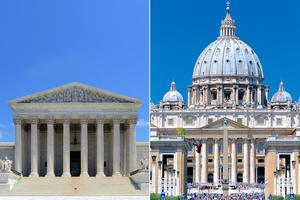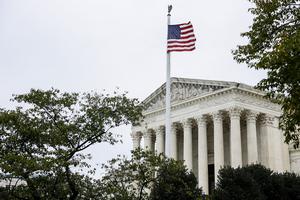3 Ways the Biden Administration Should Respond to Global Religious Persecution
COMMENTARY: ‘Report on Religious Freedom in the World’ lists dire statistics that require urgent response.

It has been two years since the horrifying bombing attacks by Islamic militants at three churches in Sri Lanka on Easter Sunday. One of the targeted churches near Colombo is named after the Christian martyr St. Sebastian. There is an important reminder here: The Christian faithful will face persecution. Now the papal charity Aid to the Church in Need (ACN) International has released its “Report on Religious Freedom in the World.” It comes to the same conclusion.
The ACN report found that Christians are the most persecuted religious group globally — by far. Moreover, global religious persecution is spreading fast. The 800-page ACN report notes that “hints at religious-freedom violations observed in our 2018 report accelerated and expanded to the current situation, where systemic and egregious attacks are coming from governments, lynching mobs, as well as international terror groups, such as Boko Haram or the so-called Islamic State and other fundamentalist groups.” Additionally, “there has been a significant increase in the severity of religiously-motivated persecution and oppression, which is the principal category of concern.”
The report’s statistical findings are shocking. In almost one out of every three countries around the world, religious freedom is not respected. The story is even more grim when seen from the perspective of the world’s population. Countries where the report found religious freedom is not respected are where two-thirds of the world’s population, approximately 5.2 billion people, live. Grave violations of religious freedom, for example, have occurred in three of the world’s most populous countries: China, India and Pakistan. ACN added nine new countries to their list of countries where grave persecution occurs: Burkina Faso, Cameroon, Chad, Comoros, Democratic Republic of Congo, Mali, Mozambique, Malaysia and Sri Lanka. So, shockingly, religious freedom is under serious assault in no fewer than 26 nations.
It’s perhaps not surprising to learn that the COVID-19 pandemic has damaged religious freedom globally. The report’s authors note that some countries have used it to single out religious activities, as opposed to secular activities. In others, humanitarian aid has been withheld from religious minorities. Specifically, “preexisting societal prejudices” present in countries like China, Niger, Turkey, Egypt and Pakistan led to denials of access to food and medical aid. And, perhaps most disturbingly, the pandemic has been “used as a pretext to stigmatize certain religious groups for allegedly spreading/causing the pandemic.”
One sinister trend is the use of technology as an additional weapon of persecution. Islamist terrorists, for example, use technology to establish a “cyber-caliphate” for online recruitment and radicalization in the West. The report notes that “counterterrorism units, although not able to neutralize the online terrorist communications, were nonetheless able to foil attacks in several Western countries.” China has also weaponized AI-technology to increase control of and discrimination against believers.
Then there is “polite persecution.” This term, says the report, “reflects the rise of new ‘rights’ or cultural norms” that, “enshrined in law, result in an individual’s rights to freedom of conscience and religion coming into a profound conflict with the legal obligation to comply with these laws.” Proponents of the Equality Act, please note, the report could easily be talking about you.
How should the Biden administration respond to this global slide toward religious persecution?
For starters, it must continue to advance the cause of international religious freedom as a foreign-policy priority. President Joe Biden’s secretary of state, Antony Blinken, to his credit, did not walk back the genocide declaration regarding China’s Uyghur population made by his predecessor, Mike Pompeo. Since then, however, there has been little coming from the State Department or the White House that shows continued zeal for denouncing religious persecution in China — or elsewhere, for that matter. This silence must come to an end.
We also urgently need someone with a proven commitment to religious freedom as our next ambassador-at-large for international religious freedom. In 1998, Congress unanimously passed the International Religious Freedom Act (IRFA), establishing the Office of International Religious Freedom in the State Department, led by an IRF ambassador-at-large. The most recent ambassador-at-large, Sam Brownback, was doggedly committed to religious freedom and the protection of religious minorities. This delay is dangerous. Surely President Biden, who credits his faith as helping him in his own life, can select someone dedicated to the cause of religious freedom globally.
Finally, there is the insidious problem that the “progressive” lobbyists close to this administration simply are not interested in protecting religious freedom and conscience rights. President Biden must restrain these “polite persecutors” by leaving space for religious and moral objection in any future executive action.
It isn’t a coincidence that the daily Mass readings this week include the account found in the Acts of the Apostles of St. Stephen’s martyrdom. Before he was put to death by stoning, Stephen told his persecutors that they were repeating the sins of their murderous fathers. Here is a timeless reminder of the opportunity to break the cycle of persecution. In the coming months, we will see whether the president takes heed.
Andrea Picciotti-Bayer is the director of the Conscience Project.
- Keywords:
- andrea picciotti-bayer
- biden administration
- aid to the church in need
- religious persection
















